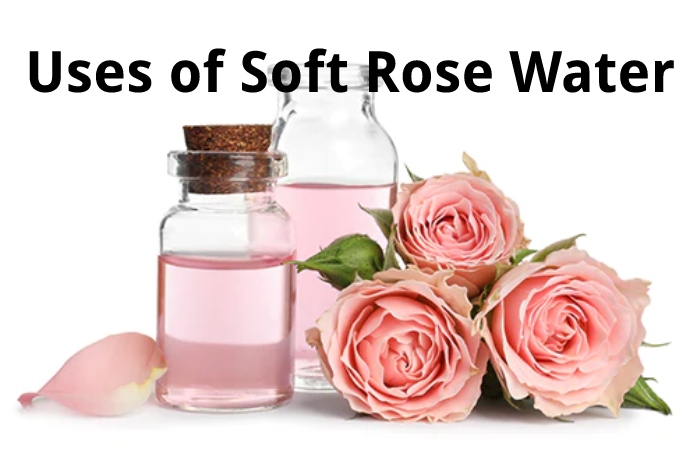Table of Contents
Soft Rose Water
It is soft rose water is believed to hold the oldest and most exciting health and beauty secrets in its delicate and intoxicating essence. In India and the Arab countries, it was used as a primary remedy to rejuvenate the skin for religious rites and food. All kinds of properties are attributed to rose water, mainly to soften and care for the skin. For this reason, today, we want to show you how you can easily prepare delicate rose water on your skin.
What is Rose Water?
Rose water or rose hydrosol is an element that, curiously, does not contain water, although it is used to obtain it. It is the result of the steam distillation of rose petals. In the same distillation process, we get the essential oil and the hydrolase from the same plant. The essential oil concentrate substance obtained from fat-soluble and volatile components, and the hydrolase is the substance extracted from the steam that causes said distillation. This accumulates water-soluble pieces that are equally beneficial for the skin since it acquires the properties of the plant of origin.
General Benefits of Soft Rose Water

A study in the Iranian Journal of Basic Medical Sciences in 2011 analyses the existing evidence on the different properties attributed to roses. Let’s see the benefits mentioned by natural medicine and if they have scientific support.
Some studies indicate that roses would offer digestive benefits: Including rose petals in our meals would help us relieve constipation. We could, for example, use them in our salads and even prepare a delicious rose tea.
There is evidence that rose petals have astringent properties: In natural medicine, placing a cloth soaked in rose infusion usually recommend against eye inflammation. However, data on the latter are inconclusive.
Roses could improve sore throats: To do this, we should cook the fruit in boiling water, with seeds included, then strain the content and drink two cups daily. Finally, the most famous benefit of roses is to improve the appearance and smoothness of the skin when applied in rose water.
Properties of Soft Rose Water
It would be anti-inflammatory and decongestant. That tonic would alleviate the signs of tiredness. If you used rose water in the morning, you would see how the bags under the eyes would be attenuated.
- It would ease the headache. Hence, placing compresses moistened with rose water on the forehead is advisable.
- Its high content of vitamin C would be necessary to synthesize collagen, according to an article in Nutrients.
- It would have a relaxing effect and help to fall asleep.
- It would prevent hair loss by improving blood flow and strengthening hair follicles.
- Thanks to its vitamins B, and E, tannins and pectin, it would be an exciting tonic to cleanse our skin.
- It has antibacterial and healing properties, so it can be helpful against acne.
How to Use Soft Rose Water?
It is best to use this preparation as a kind of tonic. In this sense, the ideal is to apply it after facial cleansing and before using cream to take advantage of its benefits more efficiently. In addition, rose water tends to be mildly abrasive, making it ideal for sensitive skin.
You can also spray small amounts of rose water throughout the day to combat dryness and tightness. In addition, dark circles and bags under the eyes can diminish with rose water. It will only be necessary to soak some cotton in the substance and place it in the eyes for a few minutes.
A Product of Great Value at All Levels
Generally, a much larger plant need to obtain a certain amount of essential oil and hydrolase. For example, in the case of roses, it estimate that around 4,000 kilos of rose petals are needed to obtain one liter of essential oil. Hence, the oil price is very high, while the hydrolase is more affordable as it is less concentrated and accepts more quantity during distillation.
But it is not only economically expensive due to the amount of raw material used, but its quality is also essential. The Damascus rose has one of the most precious aromas in perfumery, and this characteristic is preserved thanks to its careful collection method. It harvest between mid-May and mid-June, always first thing in the morning, when the roses still cover in dew and before their buds open, receiving as little sun as possible.
What to Use Soft Rose hydrolase For?
Rosa damascene hydrolase is a very appropriate ingredient to treat the skin due to its softness and its many benefits: anti-inflammatory, decongestant, antiseptic, antibacterial, emollient, healing, regenerating. In with high levels of vitamins and antioxidants (C, E, K, and carotenoids) that fight free radicals. It is perfect for toning the face and balancing the pH after cleansing. If but moisturizing without altering how delicate the skin may be. That is why it is a recurring ingredient in cleansing lotions and toners because. It is suitable for all skin types since it provides the function the skin needs for each.
Sensitive, reactive, or rosacea-prone skin: non-irritating, with a vasoconstrictor action that reduces skin redness.
Dry or mature skin: regenerates the dermis and prevents the appearance of expression lines.
Combination or oily skin: the mild astringent effect that helps close the pores, helpful in treating and preventing acne due to its bactericidal and sebum-regulating action.
Uses of Soft Rose Water

1. Tired Feet
It has anti-inflammatory and decongestant properties. Therefore, if you have problems with tired and swollen feet, you can use it to put your feet in hot water with some rose water.
2. Reduce Eye Bags
Its anti-inflammatory effect is also evident if we use it in the morning to reduce bags under the eyes. In a few days, you will observe its beneficial effects: the result is a rejuvenated look with no signs of tiredness.
3. Relieve Headache
In this case, we will use compresses, which we will apply to the forehead soaked with rose water: we will quickly feel relief.
4. For the Skin
It regulates fat production; it is perfect for dry or oily skin. For sensitive skin, it serves as a relief and for normal, combination, and oily skin, it purifies them. Levels collagen production and tightens the skin, reducing stretch marks, wrinkles and concealing scars. It is ideal for skin with acne or rosacea, as it immediately reduces redness and calms the skin. In addition, thanks to its healing properties, it helps to reduce the marks produced by acne.
5. For the Hair
Applying it after washing your head prevents hair loss by improving blood flow and strengthening hair follicles. In addition, it prevents hair loss by improving blood flow and strengthening hair follicles.
6. For Colds
The fruit of rose bushes usually use to improve flu and colds. That is the fruit that remains on the plant when the rose has already dried. We cook them in boiling water, with seeds included, then strain the content and drink two cups daily.
7. In Gastronomy
It use to flavor meats, salads, sweets, desserts, and drinks throughout the former Maghreb area. Currently, it also use for the most elaborate recipes of many chefs.
8. Eliminate Dark Circles
Rose water can significantly reduce the signs of tiredness. To do this, moisten some cotton and leave them for 5 minutes in your eyes.
Conclusion
Rose water obtain from the distillation of rose petals. The art of distilling rose petals introduce to the West by the Arabs in the 10th century. It Shortly after, the French began to make it. Today we can find it in pharmacies, perfumeries, etc. It made by industrial methods as it use in the formulation of many cosmetic products. It can also obtain at home, and very few materials need. However, it is more practical to buy the prepared product since it is reasonably cheap.
